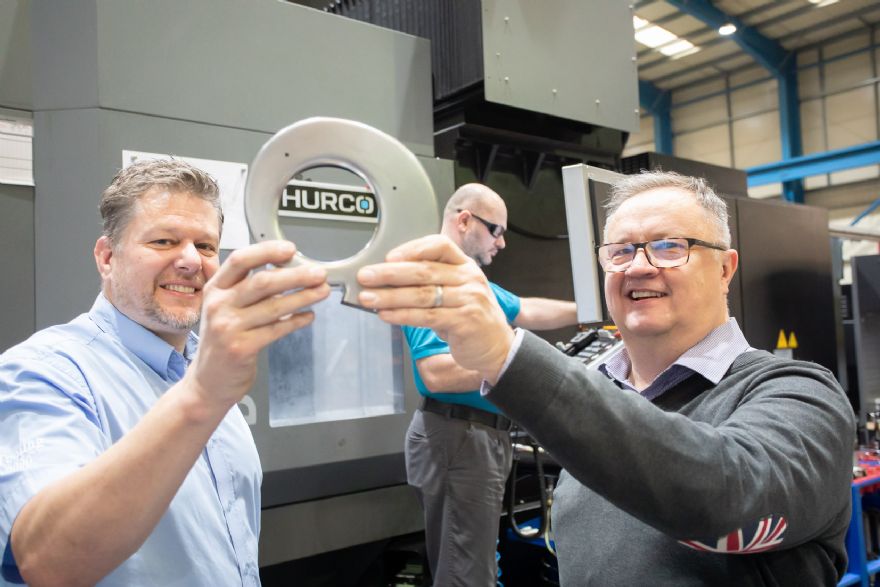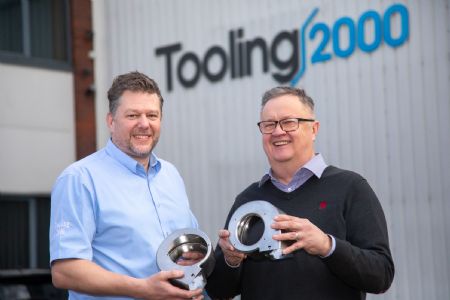
A manufacturing match made in the West Midlands has provided a much-needed reshoring solution for innovative new body drying technology. Birmingham-based
Tooling 2000 Ltd, a metal stamping and precision component specialist, came to the rescue when
iDry Ltd’s roll-out of its iDry product was set to stall due to the existing Chinese supplier giving a nine-month lead time for three crucial components
Tooling 2000 used its expertise in forming and prototyping, combined with a wide variety of CNC and laser cutting machinery, to produce an emergency tool that could produce the fan housing parts, in just seven days.
Moreover, the components are better quality and more aesthetically pleasing thanks to the use of stainless steel and the new process — initial orders placed are worth more than £50,000.
This UK reshoring success story could well become a million-pound opportunity for both companies, with Much Wenlock-based iDry expected to sell 200 units every week as its unique air-drying technology is embraced by local authorities, care homes and luxury hotels.
Gary Seale, iDry Ltd managing director, the UK’s only manufacturer of body dryers, said: “The iDry, which was first developed in 1991 by Michael Godwin and brought back to life earlier this year, fits onto a wall and uses a patented design to push air through vents to dry your body in as little as 2min.”
“It is a breakthrough that is proving extremely popular with the care sector where it can help the elderly or disabled enjoy independent living for longer. This has seen a major spike in interest, but just as the orders were rolling in an existing Chinese supplier tried to hold us to ransom with lead times and minimum order quantities.
“I won’t lie, it felt like they were putting a gun to our head, so we knew he had to accelerate our desire for more UK content by switching supply to a domestic company — the only issue being we had to find an answer in seven days.”
He added: “A chance introduction on LinkedIn has proven to be a match made in heaven with Tooling 2000 delivering a solution that is better in what was an unbelievably stringent lead time. Better still, the early signs are that we can place more parts with it, something we are currently looking to explore.”
Creating complex partsEstablished in 1996, Tooling 2000 specialises in creating complex parts out of anything that is metal and it was this dynamic approach that paid dividends when supporting iDry. The firm’s engineers quickly got to work with some soft tooling that allowed it to get to grips with the initial three parts and then a second tool was put in place that offered greater repeatable quality and facilitated a change from galvanised steel to stainless steel.

Using laser cutting technology and the latest CNC three-axis machines, a new process has been developed that reduces manual work and assembly time — two important features as volumes escalate.
Gary Williams, Tooling 2000 managing director, said: “This is a fantastic reshoring success story and shows that the UK can outperform international rivals when it comes to quality, lead times and, importantly, cost — we just need the opportunity to prove it.
“The way we are set-up is to combine the best design and engineering minds, with investment in the latest technologies, investing over £1 million recently into a large Hurco DC42XI CNC (used in this latest project) and a five-axis Trumpf TruLaser Cell 7040 that will deliver the best laser cutting expertise.”
He concluded: “Gary from iDry and I have engaged our respective engineers to look at other parts we might be able to help with, starting with the impeller it uses to create some of the power.”
iDry launched its latest version of the iDry at
The Occupational Therapy Show held last month at the Birminham NEC. The hygienic and eco-friendly product uses Bluetooth controls for the first time and will have a more streamlined design that uses 28 air pores to push warm air through at between 50 to 70deg.
Demand from the show, combined with the current pipeline of activity, suggests that volumes could reach 200 units per week by the first quarter of 2022.